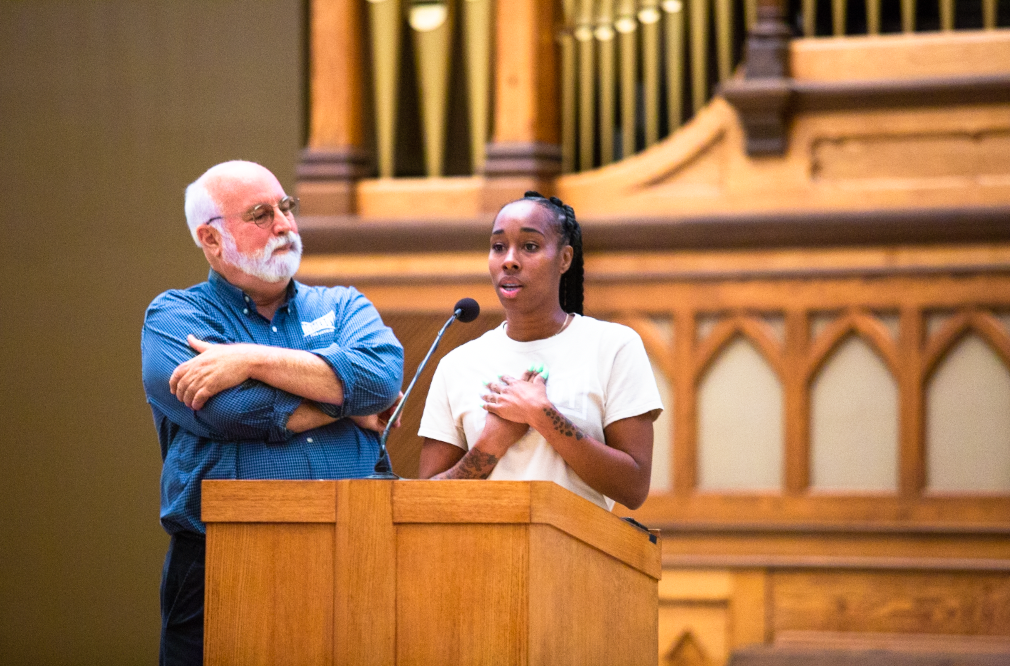Greg Boyle, S.J., shares experiences on the power of radical kinship
Greg Boyle, S.J., founder of Homeboy Industries, spoke to a packed audience in the Chapel of Saint Joseph on the evening of Sept. 12.
Homeboy Industries is an organization in Los Angeles which provides resources for formerly gang-involved and previously incarcerated persons to reintegrate back into society. At the event, Boyle shared some of his experiences of how he has been able to break down barriers to transform his community through human connection.
“All of us are called to do one thing: to create and nourish a community of kinship,” Boyle said.

The event was hosted by the Faith-Justice Institute’s Joseph William and Madeline Eberle Klein Fund, which supports educational events that seek greater inclusion in the Catholic Church.
“I believe his presentation challenges us to think more critically and relationally about these areas [community engagement, diversity and inclusion and care of the whole person] both as an institution and individuals,” said Ann Marie Jursca Keffer, MSW, director of the Faith-Justice Institute.
At the event, titled after his most recent book, Barking to the Choir: The Power of Radical Kinship, Boyle shared his stories of creating connections with former gang members and why these relationships matter.
“It doesn’t matter how many times you hear them when he shares his experience at Homeboy with you, he makes it come alive for us and all of a sudden the distances and the separations and all the prejudices and biases are challenged,” said Dan Joyce, S.J., executive director of mission programs.
Sharnise Simmons, a former gang member, spoke alongside Boyle about her experience at Homeboy Industries and how it has provided her the opportunity to change her life’s direction. She shared the story of her childhood, her discovery of the organization and her current progress in working toward her GED.
“Homeboy gave me the opportunity to work on myself, to get to know myself,” Simmons said. “I am so thankful.”
Homeboy Industries is the largest and most successful gang intervention, rehab, and reentry program in the world. Sharnise is one of over 15,000 former gang members who walk through their doors each year looking to redirect their lives.
“[I discovered] that I was brave and strong,” Simmons said in response to an audience member’s question about her most important self-discovery since joining Homeboy. The crowd erupted into a roar of applause.

One member of the audience, Kevin Pitts, M.A.,’20 recently moved to Philadelphia and has been a long-time fan of Boyle and was impacted by the stories he shared.
“It’s just answering for myself the questions that he asked,” Pitts said. “What am I doing? How am I standing with the people at the margins? Am I doing that? What’s preventing me?”
Katie Sellers ’21 shared her experience with the Weekly Service program at St. Joe’s and its goal to provide students with the opportunity to engage in neighborhoods of Philadelphia to act as agents of change.
“Part of their point is to get us out of the bubble of St. Joe’s and out into the community beyond,” Sellers said. “St. Joe’s doesn’t exist in its own little bubble. It exists in a community and we are part of a larger community.”
Boyle emphasized that regardless of how one chooses to engage in their community, everyone has the capacity to cross the margins and bridge the distances that exist in society.
“The measure of our compassion lies not in our service to those who lay on the margins, but only in our willingness to be in kinship with them,” Boyle said.

Ana Faguy ’19, Luke Malanga ’20 and Alex Mark ’20 contributed to this report.













































